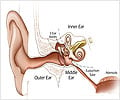A University College London research team has reported the first known case of someone born without the ability to recognise voices, a rare condition which is scientifically known as phonagnosia.
The first known case of someone born without the ability to recognise voices, a rare condition which is scientifically known as phonagnosia, has been reported by a University College London research team.
The researchers are urging other people to come forward if they think they have also grown up with the condition.Reporting the case in the online edition of the journal Neuropsychologia, the researchers revealed that a woman could not recognise people by their voice, including her own daughter whom she has great difficulty identifying over the phone.
known as KH, the 60-year old successful professional woman avoids answering the phone where possible, and for many years has only answered 'booked calls'. She books calls with friends or co-workers, so that she knows who to expect when the telephone rings at a certain time.
KH was aware from an early age that there was something she couldn't do that others clearly could, but it was only when reading an article in a popular science magazine years later that she finally understood her lifelong problem.
Though the article discussed prosopagnosia in which people have severe difficulty recognising faces, KH realized she might have the vocal analogue of prosopagnosia, and contacted the magazine.
The magazine then put her in touch with UCL's Dr Brad Duchaine, the co-author of the paper.
"Voice recognition may not seem as important as face recognition, given that failing to recognise someone in front of you can cause much more social anxiety than not recognising them over the phone. Yet we rely on voice recognition in our day-to-day lives, to identify people on the phone or those speaking on the radio," Dr. Duchaine added.
They observed that KH struggled to recognise the voices of famous actors and politicians, and also had difficulty learning and recognising new voices.
Compared to a control group of volunteers, nearly all of whom identified the voices of Margaret Thatcher, David Beckham, Dawn French, Chris Tarrant, Joanna Lumley, Sean Connery and Ann Widdecombe, KH was only able to identify the voice of Sean Connery.
However, KH performed well on nearly all other tasks.
Phonagnosia has only been documented so far in people with brain lesions in the right hemisphere following a stroke or brain damage, and the mechanisms behind it are not well understood.
In KH's case, a MRI brain scan showed no evidence of brain damage in regions associated with voice or auditory perception, and her hearing abilities were found to be normal.
Source-ANI
RAS/SK
 MEDINDIA
MEDINDIA




 Email
Email




